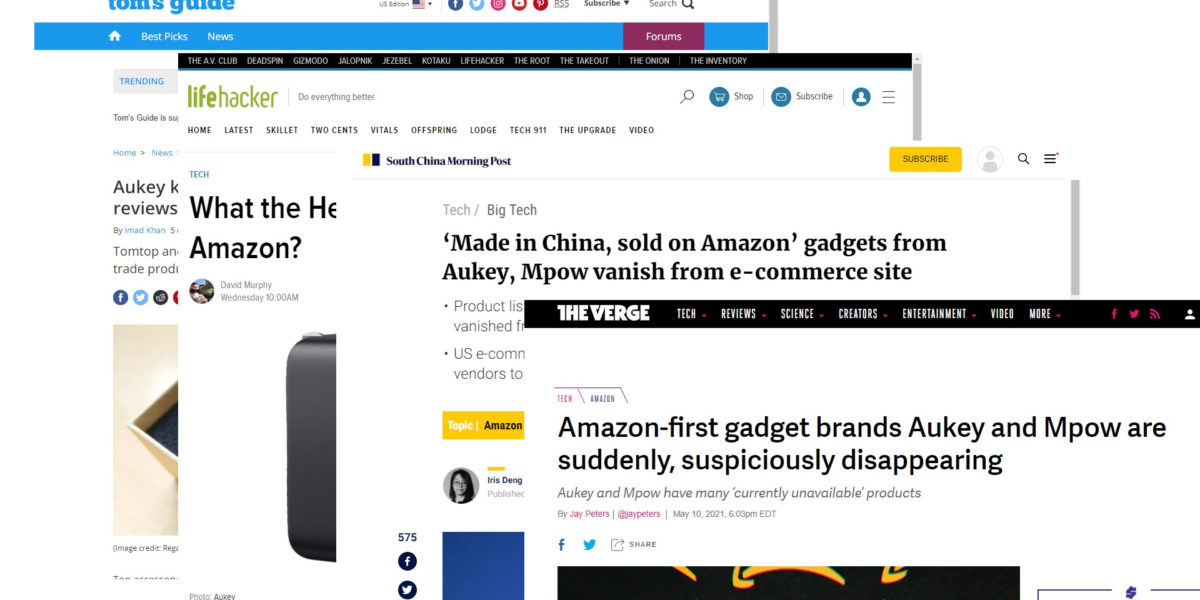Whenever you consider buying a product on Amazon, you likely rely on two things to make your decision, customer reviews and what Amazon places at the top of the search page.
Nowadays, consumers rarely go to the store to try out a product firsthand before purchasing, so they listen to the opinions of those who have actually used the products. Especially on Amazon.com, where the vast majority of products are from the other side of the world, it can be difficult to separate the wheat from the chaff. Just because a product page is written in poor English does not mean that it is inferior, especially if hundreds if not thousands of satisfied customers can attest to its merit.
This is how Americans think. We trust customer reviews, because honestly we have little else to go on.
Last week proved why Americans should not trust customer reviews on Amazon. In a stunning move, Amazon took down the listings of some of China’s most well-known sellers, including Aukey, Mpow, Tomtop, and Tacklife. Although neither the brands nor Amazon have publicly addressed the reason, it seems to be the result of a massive data leak uncovering thousands of fake reviews on these companies’ Amazon listings. The extent of the data leak, exposing PayPal payments made to customers in exchange for 5-star reviews, was covered in great detail on SafetyDetectives.com.
Why is this such a surprise? It is not surprising that Amazon third-party sellers purchase fake reviews to boost their products. Anyone who has worked with the sellers involved could have told you that, as many of them make no secret of their business strategy. Give them credit for honesty—managers all across Shenzhen (where most Chinese Amazon sellers are based) will tell you that they think it is a better use of company money to buy fake reviews than to invest in building a brand.
Not only do these fake reviews induce potential customers to buy, but they are critically important in getting shoppers to see them in the first place. On Amazon, there are scores of similar products all competing for the same eyeballs. Amazon’s A9 algorithm heavily rewards listings with the most positive reviews. Sellers are incentivized to “fake it ‘til they make it,” using black hat tactics to get fraudulent ratings, then they can reach out to real customers to ask for real reviews when the time comes.
Everybody who works in e-commerce knows this. The surprising part is not the offense but the penalty. More Amazon merchants are based in China than in the United States, and many of them are fly-by-night operations. Aukey, for example, is not. The consumer electronics brand is believed to do around $1 billion in business each year. That is no accident—Aukey’s earphones are quite good, and the company has built up well-earned credibility with the American consumer.
All of a sudden, the American consumer can no longer buy Aukey earphones, at least not on Amazon. Reviews of Aukey products on trusted sites like CNET and Wirecutter now feature broken links. One has to wonder how long this shadow ban will last.
The consensus in China is that Amazon is sending a message, not just to the large companies that were penalized but also to the hundreds of smaller ones who were not singled out. If a big brand like Aukey or Mpow has to face the consequences, then there is a chance that anybody might. We expect all these brands to be back on Amazon relatively soon, perhaps after issuing some sort of apology, so it will be interesting to see in the long run if anything changes.

